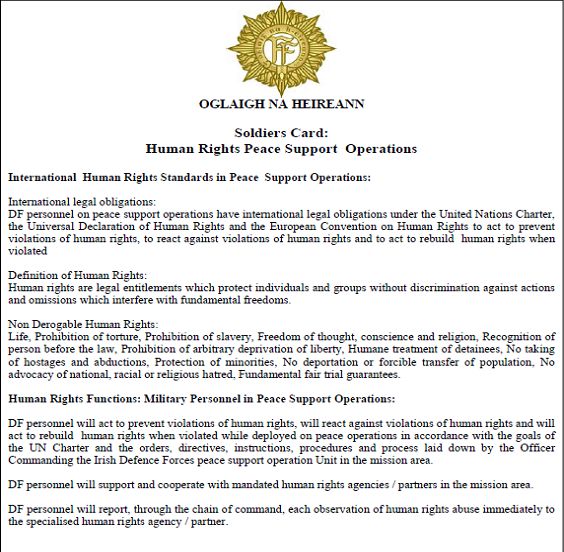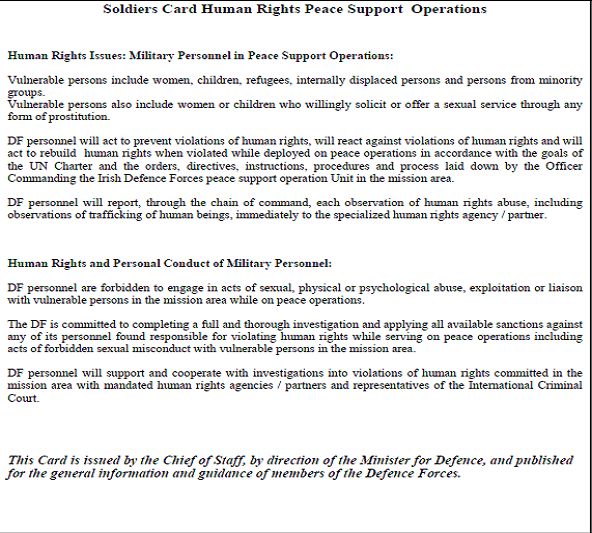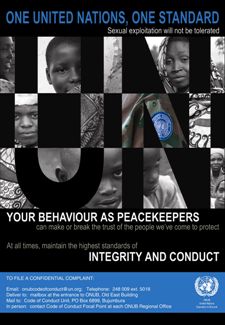Examples of military operational policies and codes of conduct:
United States Department of Defense Instruction on Sexual Assault Prevention and Response Program Procedures (2008)
As part of the implementation of the Department of Defense’s (DoD) policy on the subject, the instruction assigns responsibilities, provides detailed guidance and templates toward a comprehensive approach to addressing sexual assault within the framework of its Sexual Assault Prevention and Response (SAPR) Program. It comprises the following sections:
-
References
-
Definitions
-
DoD SAPR Program Requirements And Procedures
-
Safe Collection And Preservation Under Restricted Reporting
-
Commander’s Sexual Assault Response Protocols for Unrestricted Reports of Sexual Assault (and Commander’s Checklist)
-
First Responder Training Requirements
-
Case Management for Unrestricted Reports of Sexual Assault
-
Sexual Assault Quarterly and Annual Reporting Requirements
-
VA and Supervisor Statements of Understanding
-
VA Sexual Assault Response Protocols (and Checklist)
-
MoU between Installation Law Enforcement Office and (City, County, State) Agency
-
Disposition Authority for Sexual Assault Cases and Authority for Review of Administrative Separations Involving Victims of Sexual Assault
-
Victim Reporting Preference Statement
-
Forensic Medical Report Sexual Assault Examination
Extracted from: United States Department of Defense. 2008. Instruction on Sexual Assault Prevention and Response Program Procedures.
Ghana’s Code of Conduct for Armed and Security Forces
Ghana addresses sexual misconduct in its Code of Conduct by drawing from the standards on sexual exploitation and sexual abuse set by the United Nations as follows:
Sexual Exploitation and Abuse
The following must be avoided:
-
Any exchange of money, employment, goods or services for sex
-
Any type of sexual activities with children (persons under the age of 18 years)
-
Any other form of humiliation, degrading or exploitative behaviour
-
Any sexual favour in exchange for assistance
-
Any type of sexual misconduct that damages the image, credibility, impartiality or integrity of the forces that deployed you
Discipline
Exhibit highest standards of discipline. All acts of indiscipline to be viewed as an affront to cohesion of the force and offenders will be severely punished.
Male/Female Relationship
Healthy and professional interaction between males and females to be encouraged. No immoral relationship to be encouraged among troops.
Rules for Code of Conduct
Do not engage in immoral acts of sexual, physical or psychological abuse or exploitation.
Respect and regards the human rights of all.
Irish Defense Forces Soldier’s card


Example: Establishment and implementation of United Nations code of conduct on sexual exploitation and abuse
In 2003, the United Nations established standards of conduct to prevent and respond to sexual exploitation and abuse perpetrated by staff members. The Secretary General’s Bulletin: Special Measures for Protection from Sexual Exploitation and Sexual Abuse (ST/SG/2003/13) states:
The following applies to all staff of the United Nations, including staff of separately administered organs and programmes of the United Nations, and to United Nations forces conducting operations under United Nations command and control.
Sexual exploitation and sexual abuse violate universally recognized international legal norms and standards and have always been unacceptable behaviour and prohibited conduct for United Nations staff. Such conduct is prohibited by the United Nations Staff Regulations and Rules.
In order to further protect the most vulnerable populations, especially women and children, the following specific standards which reiterate existing general obligations under the United Nations Staff Regulations and Rules, are promulgated:
-
Sexual exploitation and sexual abuse constitute acts of serious misconduct and are therefore grounds for disciplinary measures, including summary dismissal;
-
Sexual activity with children (persons under the age of 18) is prohibited regardless of the age of majority or age of consent locally. Mistaken belief in the age of a child is not a defence;
-
Exchange of money, employment, goods or services for sex, including sexual favours or other forms of humiliating, degrading or exploitative behaviour, is prohibited. This includes any exchange of assistance that is due to beneficiaries of assistance;
-
Sexual relationships between United Nations staff and beneficiaries of assistance, since they are based on inherently unequal power dynamics, undermine the credibility and integrity of the work of the United Nations and are strongly discouraged;
-
Where a United Nations staff member develops concerns or suspicions regarding sexual exploitation or sexual abuse by a fellow worker, whether in the same agency or not and whether or not within the United Nations system, he or she must report such concerns via established reporting mechanisms;
-
United Nations staff is obliged to create and maintain an environment that prevents sexual exploitation and sexual abuse. Managers at all levels have a particular responsibility to support and develop systems that maintain this environment.
The standards set out above are not intended to be an exhaustive list. Other types of sexually exploitive or sexually abusive behaviour may be grounds for administrative action or disciplinary measures, including summary dismissal, pursuant to the United Nations Staff Regulations and Rules.
Implementation of the code of conduct
In 2008, a United Nations expert group meeting identified four pillars to effectively implement the code of conduct addressing sexual exploitation and abuse:
Raising public awareness and engaging communities:
-
The head of the security forces can issue a zero-tolerance policy statement to demonstrate commitment to the code of conduct.

-
Initiate distribution and awareness-raising campaigns for the public through civil society oversight bodies or community groups.
-
Establish various mechanisms for communities to monitor or report violations of the policy / code (e.g. hotlines or anonymous reporting processes; drop boxes). For example, as part of its Gender Desk, the Rwandan Defense Forces has a free hotline (3945) for reporting abuse cases involving the military.
Prevention of abuse through socialization and training of in-service security personnel and recruits (at all levels):
-
Distribute and post the policy / code throughout police stations and army barracks – for example as booklets, flyers or posters. See for example, the One UN, One Standard poster from Burundi (2005), also available in French.
-
Provide specific training on the code to socialize all personnel (both management and operational staff) and recruits on its contents and significance for the institution, and to ensure its implementation and enforcement.
-
For example, see the video ‘To Serve with Pride’ (2008) developed for United Nations personnel.
To Serve with Pride. E-E from UN PSEA on Vimeo.
-
Develop screening mechanisms (i.e. background checks) during recruitment to prevent hiring of individuals with a history of committing abuse or exploitation.
Response Systems (including recording, investigating, and acting on complaints):
-
Develop complaints procedures for personnel to report incidents of abuse.
-
Establish an internal Sexual Exploitation and Abuse disciplinary system
-
Identify external independent oversight mechanisms to investigate allegations against the security personnel – such as police complaints boards, ombudspersons offices.
-
Create mechanisms to provide support for victims of abuse.
-
Management and coordination of efforts
-
Develop inter-agency groups and networks of organization working on the issue.
-
Improve leadership commitment and capacity of supervisors to monitor and support personnel
-
Integrate the code of conduct into all contracts and partnerships.
-
Establish mechanisms to monitor practices and ensure compliance with standards is met.
Source: United Nations. “Protection from Sexual Abuse and Exploitation by UN and related personnel; Denham, T. 2008.